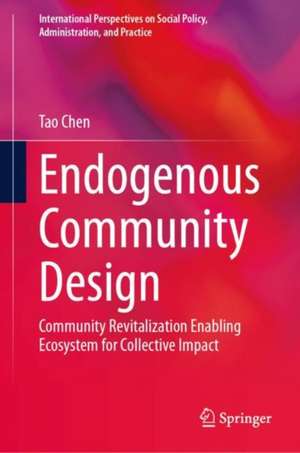Endogenous Community Design: Community Revitalization Enabling Ecosystem for Collective Impact: International Perspectives on Social Policy, Administration, and Practice
Autor Tao Chenen Limba Engleză Hardback – 30 apr 2024
This book is ideal for community leaders, government officials, NGOs, urban planners, social innovators, and anyone passionate about sustainable community development.
Din seria International Perspectives on Social Policy, Administration, and Practice
- 15%
 Preț: 643.34 lei
Preț: 643.34 lei - 18%
 Preț: 727.18 lei
Preț: 727.18 lei - 5%
 Preț: 367.64 lei
Preț: 367.64 lei -
 Preț: 393.52 lei
Preț: 393.52 lei -
 Preț: 389.11 lei
Preț: 389.11 lei - 18%
 Preț: 895.58 lei
Preț: 895.58 lei - 15%
 Preț: 713.84 lei
Preț: 713.84 lei - 15%
 Preț: 587.02 lei
Preț: 587.02 lei - 15%
 Preț: 469.74 lei
Preț: 469.74 lei -
 Preț: 390.63 lei
Preț: 390.63 lei -
 Preț: 387.96 lei
Preț: 387.96 lei - 5%
 Preț: 647.49 lei
Preț: 647.49 lei - 5%
 Preț: 708.23 lei
Preț: 708.23 lei - 24%
 Preț: 722.24 lei
Preț: 722.24 lei - 18%
 Preț: 1111.53 lei
Preț: 1111.53 lei - 18%
 Preț: 794.88 lei
Preț: 794.88 lei -
 Preț: 386.39 lei
Preț: 386.39 lei -
 Preț: 404.13 lei
Preț: 404.13 lei - 19%
 Preț: 389.36 lei
Preț: 389.36 lei
Preț: 726.55 lei
Preț vechi: 886.03 lei
-18% Nou
Puncte Express: 1090
Preț estimativ în valută:
139.07€ • 151.11$ • 116.89£
139.07€ • 151.11$ • 116.89£
Carte tipărită la comandă
Livrare economică 21 aprilie-05 mai
Preluare comenzi: 021 569.72.76
Specificații
ISBN-13: 9783031567551
ISBN-10: 3031567552
Ilustrații: XIII, 150 p. 94 illus., 41 illus. in color.
Dimensiuni: 155 x 235 mm
Greutate: 0.41 kg
Ediția:2024
Editura: Springer Nature Switzerland
Colecția Springer
Seria International Perspectives on Social Policy, Administration, and Practice
Locul publicării:Cham, Switzerland
ISBN-10: 3031567552
Ilustrații: XIII, 150 p. 94 illus., 41 illus. in color.
Dimensiuni: 155 x 235 mm
Greutate: 0.41 kg
Ediția:2024
Editura: Springer Nature Switzerland
Colecția Springer
Seria International Perspectives on Social Policy, Administration, and Practice
Locul publicării:Cham, Switzerland
Cuprins
Chapter 1. Introduction.- Chapter 2. Literature Review.- Chapter 3. Endogenous Community Design.- Chapter 4. Endogenous Community Design for Collective Impact.- Chapter 5. Capacity Building Methodology.- Chapter 6. Enabling Ecosystem Test Practice.- Chapter 7. Conclusion.- Chapter 8. References.
Notă biografică
Tao Chen received his Ph.D. in design, with research interests in service design, social innovation design, and community design.2021 He was appointed as a postdoctoral researcher at Guangdong University of Technology, during which he conducted research on constructing an endogenous socio-technical system design model based on idea tree thinking. Now, he is working at Shandong University of Science and Technology, conducting teaching and research on service design-driven social innovation. He has published articles on service design, regional revitalization and community design, and has been awarded research projects by China Postdoctoral Science Foundation, Guangdong Province Social Science Planning Project and Shandong Province Art Science Special Project. In addition, he is actively involved in design execution, combining theoretical research with design practice, conducting the first Guangzhou Nansha District Youth Overseas Chinese Cultural Creators Workshop and activities, drivinglocal people to participate in collective co-creation of social innovation activities through service design. In the future, he will continue to explore urban-rural integration, smart communities and local sustainable design.
Textul de pe ultima copertă
This book is a comprehensive exploration of endogenous community building, aiming to investigate how to create a vibrant, service-integrated, and sustainable community through collective impact approaches. It’s a guide to social innovation that combines theory and practical application. In terms of theory, it constructs concepts such as endogenous community, endogenous design system, life project platform and enabling ecosystem. In practice, it offers design methods and a toolkit for collective impact to enhance community resilience and capacity through service co-creation. This book provides readers with a systematic guide to endogenous community design, ranging from conceptual understanding and theoretical models to practical methodologies. Its aim is to build a sociotechnical system from the bottom-up to address complex issues.
This book is ideal for community leaders, government officials, NGOs, urban planners, social innovators, and anyone passionate about sustainable community development.
This book is ideal for community leaders, government officials, NGOs, urban planners, social innovators, and anyone passionate about sustainable community development.
Caracteristici
Develops theoretical models for grassroots capacity building in the fields of social work and community design. Provides specific guidance methods on the practical implementation of collective impact through self-organization. Envisions a future planning strategy for proximity life circles designed by people.
